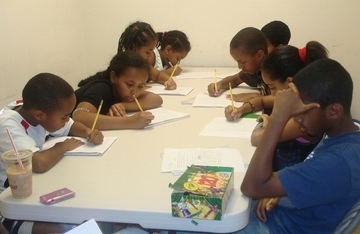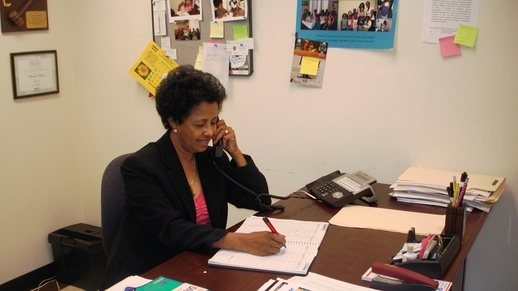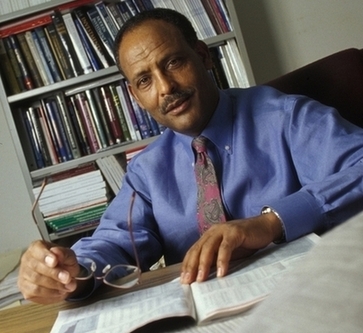 Above: Students attend Amharic language lessons run by Washington D.C.'s Ethiopian Community Center.
Above: Students attend Amharic language lessons run by Washington D.C.'s Ethiopian Community Center.
Tadias Magazine
By: Martha Z. Tegegn
Published: Tuesday, September 29, 2009
Washington DC (TADIAS) — Before Washington D.C.’s Ethiopian Community Center (ECC) commenced its operations in the early 80′s, newly arriving Ethiopians resettling from various refugee camps in Africa had very little resources to rebuild their lives. Majority of the refugees were fleeing harsh economic realities and civil war. “We needed to start something immediately,” says Ms. Hermela Kebede, who was present at ECC’s inception, and witnessed first-hand the large influx of Ethiopian refugees who were being assisted mainly by the United Nations Higher Commission for Refugees (UNHCR). The Voice of America news service recently cited U.S. Census Bureau statistics revealing that “there are now close to one million African immigrants in the United States and more than 50 percent of them entered and settled in the country between 1990 and 2000.”
It was important, according to Ms. Kebede, that “a community center of some sort was established.” ECC was set up after several elders in the community gathered together and drafted a plan. Ms. Kebede has been serving as ECC’s Executive Director since 1992. Since its founding, the ECC has provided legal information and referral services on issues ranging from education and health care resources to employment and immigration assistance.
Now, years later, new challenges are being raised by first generation Ethiopian-Americans. “Parents have a genuine concern that their children, many of whom were born and raised in the United States, presently face a cultural identity crisis,” says Ms. Kebede. In recent years this has prompted the ECC to secure funding and to provide a comprehensive Ethiopian culture program, which includes Amharic language lessons, workshops, and traditional dance classes in order to positively introduce first generation Ethiopian-Americans to their heritage.
“My two kids love to come and learn about Ethiopia,” said Tesfaye Mekuria, a former service user and father of two summer campers, Bethlehem and Abel Tesfaye. “They enjoy learning about the history, culture and way of life in Ethiopia. Every time they ask me a question such as how many provinces there are in Ethiopia, I turn to ECC because being away from home, I am clueless myself. Sending them to ECC is indirectly a learning process for me.” The summer camp that Mr. Tesfaye is talking about has successfully taught approximately 200 Ethiopian American children since it’s inception five summers ago.
Slideshow: Photos courtesy of ECC.
The Ethiopian American community is now one of the largest African immigrant communities in the United States. This has created increased pressure on community centers such as the ECC to seek greater funding and include English as a Second Language (ESL) courses for the target population. “ESL wasn’t a major issue at the beginning because the first wave of Ethiopian immigrants were fairly acquainted with English before they settled in America. To the contrary, there is a greater demand of ESL services now for more recent immigrants,” note Ms. Kebede.
“Before I came to the ECC to take ESL courses I was just struggling to work and communicate with my few words of English,” says Messeret Wasse, a frequent visitor to the center. “I couldn’t understand a word of the letters and documents that I received on the job.” The single mother of two who also sends her kids to the Ethiopian Summer camp says, “Thanks to the Community Center now, I can understand every letter that I receive, and I can communicate fairly easily in English.” ESL is among the most successful services provided by the ECC.

Ms. Hermela Kebede, Executive Director of ECC.
The demographics of the Ethiopian immigrant community has dramatically changed which requires ECC to come up with new, contemporary and innovative approaches for affordable and broader range of services. ECC now provides health referral services, an indispensable feature of its outreach program. “We assist people who reside in DC to obtain free health insurance,” said Ms. Woubedle Alemayehu, the HIV Coordinator for ECC. “Most immigrants and their children are uninsured and our goal is to inform them of available services through federal and city government services, and to advise them on how to use them.”
ECC works hand-in-hand with the DC government to provide health and educational services. “Through this important partnership ECC has held two Community Health Fairs, designed especially for the African immigrant community. The program entitled “Being Healthy is Your Responsibility” has provided HIV testing and health related information to members of the African immigrant population. ECC, like many non-profit organizations, struggles to sustain its services. The main challenge is the constant struggle to get funding and obtain new resources.
To address its recent demands from the community ECC developed several new initiatives which volunteerism, reorganizing the Board of Directors, and seeking and utilizing the larger community’s feedback. “Involving the community is one of our highest objectives,” said Professor Lemma Senbet, the new Chair of ECC’s Board of Directors and a renowned scholar and financial expert. “In order to improve services and implement them successfully the input from the community being served is vital.”
The Ethiopian community has generally had low volunteer turnout which have affected some areas of services such as outreach and advocacy. “We are at a critical stage now, and the Center currently faces five critical gaps: community involvement, technology-based communication, administrative, facility, and resources.” Senbet asserts. “Moving forward, the newly recognized Board, with five new members, is determined to grow the Center to the next level by narrowing these gaps in a significant way.”

Lemma W. Senbet, Professor of Finance at the Smith School
of the University of Maryland, is the new Chair of ECC’s Board
of Directors. (Courtesy photo).
Most programs that the ECC offers are grant funded, and according to Ms. Kebede, also must be executed by a specific timeline. At the end of the grant period, some programs continue to receive funding while others may run out of funding, making it very difficult for the Center to maintain and keep staff. The current economic situation and the fact that DC has one of the highest numbers of non-profit organizations make it even more competitive to secure funding,” says Ms. Kebede. So, the new Board has limited time to come up with fresh ideas that can generate new revenue which will enable the center to sustain the highly needed services. According to Dr. Senbet, ECC will be
holding a town hall meeting sometime in October to evaluate the current needs of the community.
Slideshow: Photos courtesy of ECC.
-
ECC welcomes all to use their services and to volunteer at the Center. Its current location is 7603 Georgia Ave., NW, Suite 100 Washington, DC, 20012. For more information, call 202-726-0800 or email eth@prodigy.net.
Join the conversation on Twitter and Facebook.


























These community centers can do so much more. I commend D.C. for at least attempting reform. The one in my city is pretty much useless. I have been advocating for similar reforms for many years and I have given up. We can do much more – just look at similar centers in the Jewish community, the Hispanic community, the Korean community, the Cuban community, etc. We should be able to give scholarships to students, artist, and small business loans to enterpruners – people who want to open restaurants, hair salons, cafes, cabs, etc — And the board members should not be friends and family, but prominent members of the community that should be able to raise funds on their own. Good beginning D.C., but we are not there yet in other cities! I would say Atlanta has the best one.
Nice article, Marthi. I guess many of the issues hold true for most Eth communities in the Diaspora but none more than the challenges faced by 1st generation immigrants in trying to instill in their child/ren a sense of pride in, and respect for, one’s culture, history and identity [ whilst of course encouraging them to tolerate, appreciate & celebrate the diverse, and often multicultural & multi-faith, communities they live in.]
This is a timely article as October is a pledge month in much of Corporate America where bosses nag us to make a contribution to non-profits. For over 10 years, I have been supporting Ethiopian Community Center in DC through payroll deduction via United Way campaign. But I stopped my contribution about a year ago. For 10 years that I have been pledging money, not one day I ever got a letter to learn about the center’s activities or even they were getting my money. Then I got on the phone and called the center, I was told, they were in the process of sending out letter, but I received none.
The US Postal Service already gives non-profits a reduced fare if not free postage, so why not update at least twice a year or just once. All I needed was to make sure that my money was being put to good cause, but after 10 years of contribution, I stopped it. Beginning this year, I will pledge my money to Ethiopia Reads and Fitsula Foundation.
Bravo! You are doing a wonderful Job. It’s appreciated we know that language is a tool to recognize identity, without language you can not be who you are. Therefore,we have to take that seriously to build our next generation.
I really admire ECC’s effort to keep in touch with our children. That’s what they need to know their roots, culture, history, etc. God bless each person who works at ECC.
If they can achieve stopping youngsters from emulating the hip-hop culture, I would consider it to be a great accomplishment.
I would like to say its great to keep the youth connected to there culture. me being african america i know the pitfalls of loosing ones identity. Ethiopia has a long and rich history and its important for all to learn of the legacy that they left. I am in college majoring in african history to be a professor. one of my specialties will be ethiopian history. So i totally understand why , its important Keep it up and keep pushing dont give up!
Invitation
First of all I would like to forward my best regard. I am Girma Debebe, who lives in Holland. I have traveled to many regions of Ethiopia and captured different types of photographs. You can see some of them on my website at http://www.myethiopia.nl
I am pleased to tell you that I am ready to participate in any occasion that promotes Ethiopia. I have quality works in photography which shows the beauty of Ethiopia.
Regards
G. Debebe
excuse me. what is your number? because my dad needs it to call you guys . thank- you
Herawe.
To: D.C.’s Ethiopian Community Center
Invitation
My name is Girma Debebe and I live in the Netherlands. I have travelled to many regions of Ethiopia and captured different types of photographs. You can access some of my works from my website at http://www.myethiopia.nl I am pleased to tell you that I am ready to participate in any occasions that promotes Ethiopia. I have quality and wide selection of works in photography which shows the beauty of the country.
With Best Regards
Girma Debebe
g.debebe@myethiopia.nl